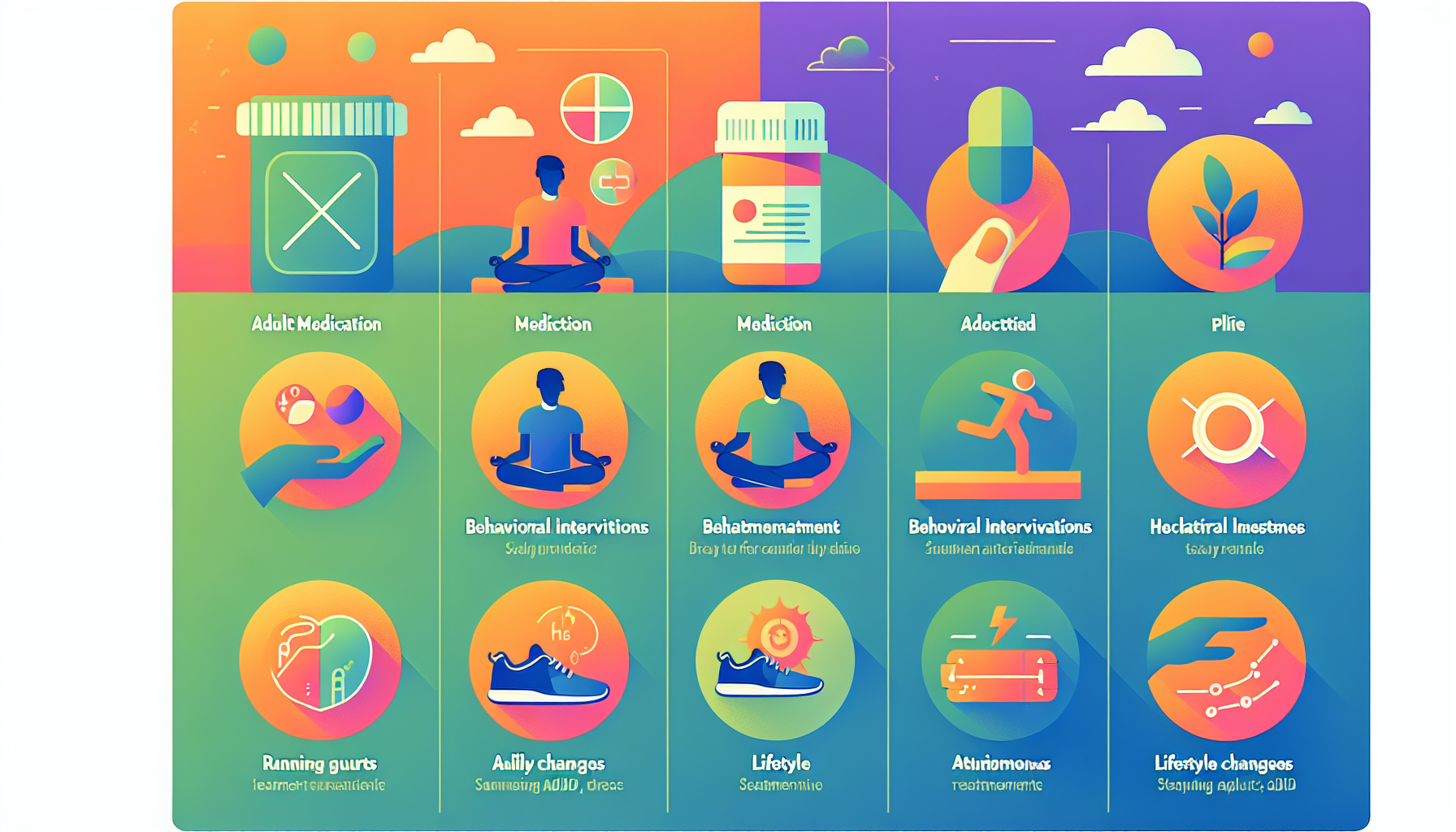Are you looking for practical and effective ways to manage ADHD symptoms in daily life? This article provides insights into understanding adult ADHD and offers strategies and treatments that can help improve focus, organization, and overall well-being. Whether you are dealing with ADHD yourself or supporting a loved one, read on to discover actionable steps for helping ADHD.
Key Takeaways
- Understanding adult ADHD is crucial for developing effective management strategies, focusing on inattention, distractibility, and organization challenges that impact daily life.
- A comprehensive treatment plan integrating medication, behavioral interventions, and lifestyle changes is essential for managing ADHD symptoms and enhancing overall well-being.
- Effective organizational strategies, including the use of tools and establishing routines, are vital for improving time management and reducing stress in adults with ADHD.
Understanding Adult ADHD

ADHD is characterized by inattention, hyperactivity, and impulsivity, which can persist into adulthood for many individuals. Unlike in children, where hyperactivity might be more apparent, adults often find that inattentive symptoms remain dominant while hyperactivity and impulsivity may decrease over time. This complex disorder, known as attention deficit hyperactivity disorder, affects various aspects of life, including work, family, and social interactions, often leading to overwhelming feelings and difficulties in managing daily responsibilities, especially when considering a deficit hyperactivity disorder adhd child’s adhd.
Understanding how ADHD presents in adults helps in grasping the challenges involved. Inattention and distractibility often hinder focus and organization, affecting careers and personal relationships. Recognizing these symptoms allows for better appreciation of the need for effective management strategies.
Recognizing Symptoms
Before:
Adults with ADHD may frequently misplace important items or struggle to stay focused during conversations, reflecting the core symptoms of inattention and distractibility. Time management issues are also prevalent, with many adults losing track of time, missing deadlines, and procrastinating on tasks. Additionally, restlessness and an inability to remain seated for extended periods are common symptoms, which can interfere with both professional and personal activities.
After:
Adults with ADHD may experience the following symptoms:
- Frequently misplacing important items
- Struggling to stay focused during conversations
- Losing track of time
- Missing deadlines
- Procrastinating on tasks
- Experiencing restlessness
- Inability to remain seated for extended periods
These symptoms can interfere with both professional and personal activities.
Another significant aspect of ADHD in adults is hyperfocusing, where one may spend excessive time on a single task, neglecting other important duties. This unpredictable behavior can lead to missed appointments, impulsive decisions, and overall disorganization in daily life. Recognizing these symptoms is the first step in managing them effectively.
Diagnosis Process
Diagnosing ADHD in adults begins with a visit to a primary care provider. Unlike other medical conditions, ADHD requires multiple assessments to evaluate symptoms comprehensively. These evaluations often involve gathering family information and reviewing historical behavior for a complete picture.
Symptoms must have been present before age 12 for an accurate diagnosis, and those over 16 need to show at least five symptoms. The process may include school reports and personal history. If initial assessments suggest ADHD, a referral to a psychologist, psychiatrist, or other mental health professional may be necessary for further evaluation.
This thorough method ensures an accurate diagnosis and a tailored treatment plan. Understanding the process can reduce anxiety and clarify steps to obtain proper support and treatment.
Treatment Options for Adults With ADHD

Managing ADHD in adulthood requires a multifaceted approach. A comprehensive treatment plan often combines medication, educational support, skills training, and psychological counseling to address the diverse needs of adults with ADHD. These treatment options aim to manage symptoms, improve productivity, and enhance overall life satisfaction.
Collaborating with healthcare professionals and family members helps create an effective treatment strategy. Regular monitoring and adjustments based on effectiveness ensure the best outcomes.
While medication can play a significant role, it is not a standalone solution; combining it with behavioral interventions and lifestyle changes can provide a more holistic approach to treating ADHD.
Medication Treatment
Medication is often a key component of ADHD treatment, helping to manage symptoms and improve daily functioning. Stimulant medications like methylphenidate or amphetamine are commonly prescribed, but non-stimulant options such as atomoxetine may be suitable for some individuals. The choice of medication should be tailored to each person, considering how to treat adhd and the benefits and potential side effects.
Responses to ADHD medications vary, emphasizing the need for personalization. Common side effects like decreased appetite and sleep problems should be reported to the healthcare provider for adjustments. Providers may need to try different medications and dosages to find the right fit.
Close monitoring maximizes benefits and minimizes side effects. The American Academy of Pediatrics (AAP) recommends ongoing observation and dosage adjustments for effective treatment. Working with your doctor tailors the medication plan to your needs.
Behavioral Interventions
Behavioral interventions are crucial for managing ADHD, particularly when combined with medication. Behavior therapy focuses on learning and reinforcing positive behaviors while reducing negative actions associated with ADHD. This approach is especially beneficial for young children but can be adapted for adults as well.
Behavioral interventions for adults may involve enhancing self-control, improving organizational skills, and developing better routines. These strategies aim to create lasting changes, significantly improving daily functioning and overall well-being. Incorporating them into everyday life helps manage symptoms and lead more structured lives.
Lifestyle Changes
Lifestyle changes can make a substantial difference in managing ADHD symptoms. Regular physical exercise is highly recommended, as it can reduce hyperactivity and inattention, relieve stress, and boost mood. Engaging in vigorous and fun activities, team sports, or mindful practices like yoga and tai chi can be particularly beneficial.
Diet also plays an important role in managing ADHD. A balanced diet rich in omega-3 fatty acids supports mood stabilization and mental health. Mindfulness meditation reduces stress, lowers impulsivity, and improves focus. Starting with short meditation periods and gradually increasing the duration can help adults with ADHD embrace this practice.
Believing that the mind and attention span can be strengthened with practice enhances the effectiveness of lifestyle changes. Learning to say no can also improve task completion, social life, and overall health by preventing overcommitment and reducing stress.
Organizational Strategies
Organizational strategies are vital for managing the daily responsibilities and tasks that can feel overwhelming for adults with ADHD. Establishing visual aids like to-do lists and visualizing end goals can help manage tasks more effectively and reduce stress. Additionally, managing financial documents and other paperwork is crucial to prevent missed payments and maintain order.
Creating a structured system with regular habits and routines can significantly improve time management and organizational skills. These strategies enhance organization, decision-making, and daily life management.
Using Tools
Using tools such as day planners, electronic reminders, and color-coding systems can greatly assist adults with ADHD in staying organized. Timers and alarms are particularly effective for managing time, ensuring that tasks are completed within set periods. Writing down a daily schedule each night can also enhance time management and set a clear agenda for the next day.
A simple, organized system for saving documents and receipts can streamline bill payments. Immediate actions like filing papers and cleaning up messes can prevent forgetfulness and maintain an organized living space.
These tools and strategies collectively help in developing routines and managing daily life more efficiently.
Developing Routines
Routines are crucial for better time management and reducing stress in adults with ADHD. Breaking tasks into smaller, manageable steps makes large projects feel less intimidating. Regular routines ensure smooth daily operations and minimize distractions.
Keeping a journal can help identify emotional patterns and triggers, providing insights for improving personal and professional life. Using online banking to automatically track balances and reduce paperwork further aids in financial management.
Developing these routines can make organizational strategies second nature and significantly improve daily functioning.
Managing Stress and Boosting Mood

Creating healthy routines can make life more manageable for adults with ADHD. Healthy habits like a proper diet, regular sleep, and physical exercise are essential for reducing stress and mood swings. Regular physical activity can significantly improve mood and reduce stress levels.
Managing stress levels and improving mood are crucial for maintaining overall well-being. By focusing on these healthy habits and integrating them into daily life, adults with ADHD can better manage their symptoms and lead more balanced lives.
Exercise and Outdoor Activities
Incorporating regular physical activity into daily life can significantly alleviate ADHD symptoms for adults. Engaging in sports or physical activities provides a fun and effective way to ease symptoms and improve overall health. Spending time outdoors in nature can lower stress and enhance focus, making it an essential part of managing ADHD symptoms.
Regular physical activities, especially outdoors, are crucial for effectively managing ADHD symptoms. These activities reduce stress, boost mood, and improve overall well-being.
Sleep Hygiene
A consistent sleep schedule improves sleep quality and emotional regulation for adults with ADHD. Good sleep hygiene directly impacts overall health and daily functioning. A regular sleep routine can mitigate ADHD symptoms, leading to better focus and mood.
Good sleep habits reduce stress and enhance the ability to stay organized and manage time effectively. Prioritizing sleep and maintaining healthy sleep hygiene can lead to significant improvements in daily life for adults with ADHD.
Improving Focus and Productivity at Work

Adults with ADHD often face challenges at work, such as extreme procrastination, trouble meeting deadlines, and impulsive behavior. A jam-packed schedule can lead to feelings of being overwhelmed and overtired, negatively impacting the quality of work. Adequate sleep is crucial, as sleep deprivation can worsen ADHD symptoms and reduce the ability to cope with stress and maintain focus.
Individuals with ADHD might be eligible for reasonable workplace accommodations. This is provided under the Americans with Disabilities Act (ADA). These accommodations can help create a more supportive work environment, improving focus and productivity.
Minimizing Distractions
Using noise-canceling headphones can significantly help adults with ADHD maintain focus in a distracting environment. Keeping a clean and organized workspace is also crucial for reducing distractions and enhancing productivity. Minimizing electronic distractions by setting boundaries with devices can further help in staying focused and on task.
Developing routines and employing behavioral interventions can reduce ADHD symptoms and help manage distractions. Collectively, these strategies support better focus and productivity at work.
Setting Priorities
Breaking up large projects into smaller, manageable tasks can prevent feelings of being overwhelmed and make task management more effective. Setting priorities and deciding on the most important tasks first helps in managing time efficiently. Using a timer to stick to a schedule can also aid in maintaining focus on tasks.
Creating a detailed checklist for tasks provides a clear roadmap and helps ensure that important tasks are completed on time. These strategies support better decision-making and time management for adults with ADHD.
Financial Management
Managing finances can be particularly challenging for adults with ADHD. Symptoms such as impulsive spending and difficulty keeping track of bills and expenses often lead to financial difficulties. Individuals with ADHD may find traditional money management systems ineffective. These systems often demand excessive time, paperwork, and attention to detail.
To improve financial management, setting up a paperwork system, dealing with mail daily, and establishing a filing system can help. Requesting electronic statements and bills can also minimize paper clutter and make it easier to stay organized.
Budgeting Tips
Setting up a simple and consistent bill-paying system can help prevent missed payments and support better financial management for adults with ADHD. Tracking expenses and avoiding impulsive spending are crucial steps in managing finances effectively.
Using day planners and daily reminders can assist in staying organized and keeping track of financial commitments. These budgeting tips ensure that financial responsibilities are met on time.
Bill Paying Systems
Establishing a straightforward system for managing bills helps reduce the chances of late payments for adults with ADHD. Setting up electronic reminders and organizing financial documents can streamline the bill-paying process.
Strengthening Relationships

ADHD symptoms, such as impulsivity and distractibility, can lead to misunderstandings and strain in personal relationships. Effective communication strategies, such as being direct and establishing regular check-ins, are essential for managing these challenges. Clear communication helps prevent ambiguity and misunderstandings.
Building strong support networks, including friends and family, is crucial for adults with ADHD to navigate relationship challenges successfully. Support groups can provide valuable insights and shared experiences, fostering understanding and practical assistance.
Communication Skills
Clear and straightforward communication is vital as ambiguity can be difficult for individuals with ADHD to interpret. Active listening techniques, such as summarizing and asking clarifying questions, can improve communication for adults with ADHD. Practicing self-management strategies, like organizing thoughts before speaking, can enhance clarity in communication.
Reducing distractions during conversations can help partners with ADHD stay focused and engaged. Building a network of supportive friends and family is also crucial for better navigating relationship challenges.
Building Support Networks
Support groups can help individuals with ADHD connect with others facing similar challenges, fostering understanding and shared strategies. Engaging in support networks can significantly improve coping strategies and overall well-being for those with ADHD.
Joining support groups provides valuable insights and shared experiences, helping adults with ADHD feel less isolated. Building strong support networks is crucial for emotional backing and practical assistance.
Seeking Professional Help
Finding a qualified mental health professional is crucial for effective ADHD management. Individual needs, family, and environment influence treatment choices. Consulting with healthcare professionals provides valuable resources tailored to managing ADHD.
Various resources, including helplines and professional advice, are available to help manage and understand ADHD. These resources provide ongoing support and can significantly improve the management of ADHD symptoms.
Finding the Right Specialist
ADHD specialists can include neuropsychologists, clinical psychologists, and ADHD coaches. A referral from a general practitioner can help find an ADHD specialist. The right specialist is crucial for effectively managing ADHD symptoms and ensuring the best treatment outcomes.
A specialist who understands your unique needs can provide personalized treatment plans and ongoing support. This collaboration significantly enhances the management of ADHD symptoms and overall well-being.
Ongoing Support
For immediate support, contact the ADDISS helpline at 020 8952 2800. Health Direct can be reached for advice at 1800 022 222. You can reach the Vandrevala Foundation Helpline by calling 1860 2662 345. Alternatively, you can also dial 1800 2333 330 for assistance.
Ongoing support and follow-up care are crucial for maintaining progress in managing ADHD and adapting treatment plans as needed. Various resources are available to provide continuous support for adults with ADHD, helping them navigate challenges and improve their quality of life.
Summary
In summary, managing ADHD in adulthood requires a multifaceted approach that includes understanding symptoms, seeking proper diagnosis, and exploring various treatment options. Medication, behavioral interventions, and lifestyle changes all play vital roles in reducing symptoms and improving daily functioning. Organizational strategies and stress management techniques further support individuals in navigating their daily lives more effectively.
Remember, building strong relationships and seeking professional help are also crucial components of managing ADHD. By integrating these strategies, adults with ADHD can lead more fulfilling and balanced lives. Take proactive steps today to better understand and manage ADHD, and don’t hesitate to seek support from professionals and loved ones.
Frequently Asked Questions
How can I recognize ADHD symptoms in adults?
To recognize ADHD symptoms in adults, look for frequent misplacing of items, difficulty maintaining focus, poor time management, restlessness, tendencies to hyperfocus, and unpredictable behavior. These signs can indicate the presence of ADHD and warrant further evaluation.
What is the process for diagnosing ADHD in adults?
The process for diagnosing ADHD in adults includes multiple assessments, collecting historical behavior information, and confirming that symptoms were present before age 12. Accurate diagnosis is crucial for effective management of the condition.
What treatment options are available for adults with ADHD?
Adults with ADHD can benefit from a combination of medication, behavioral interventions, lifestyle changes, and psychological counseling. This integrated approach typically leads to the most effective management of symptoms.
How can I manage stress and boost my mood with ADHD?
To effectively manage stress and boost your mood with ADHD, incorporate regular exercise, maintain a balanced diet, practice mindfulness meditation, and prioritize good sleep hygiene. These healthy habits will significantly enhance your well-being.
Why is professional help important for managing ADHD?
Professional help is essential for managing ADHD as it offers individualized treatment plans and continuous support, which are critical for effectively addressing symptoms and enhancing overall well-being.
Original content from the Upbility writing team. Reproduction of this article, in whole or in part, without credit to the publisher is prohibited.









